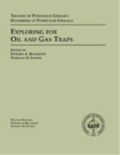Geological fieldwork benefits
| Exploring for Oil and Gas Traps | |

| |
| Series | Treatise in Petroleum Geology |
|---|---|
| Part | Predicting the occurrence of oil and gas traps |
| Chapter | Value of geological fieldwork |
| Author | Denise M. Stone |
| Link | Web page |
| Store | AAPG Store |
The major benefits of doing geological fieldwork include the following:
- Cost effectiveness
- Competitive advantage
- First-order data
- Integration of data
- Confidence boosting
- Marketing tool
- New ideas
Cost effectiveness
Geological fieldwork can be a cost-effective tool for assessing technical exploration risk. Compared with more sophisticated exploration techniques, the cost of a field program is a bargain. Acquiring, processing, and interpreting seismic data, for example, costs orders of magnitude more.
Competitive advantage
Geological fieldwork can provide a competitive advantage. Fieldwork results can advance specific business recommendations on how to proceed with exploration or manage technical risk.
For example, geological fieldwork was applied successfully to an exploration program by Exxon in the Rover Boy days to high-grade worldwide basin areas.[1] Understandably, specific objectives and results of these and other exploration field efforts rarely become public; they reside in company files due to their proprietary nature. Similarly, in the literature, results of exploration field efforts are not specifically stated as such but tend to be buried in the broader results published.
First-order data
Geological fieldwork lets us acquire first-order data. We cannot just assume that all necessary geological fieldwork has already been done. Current maps and data may not be valid. And it isn't always safe to assume the other guy did it correctly—particularly when spending exploration money is involved. There also will, most certainly, have been new techniques, concepts, and tools that have emerged since the last fieldwork data was gathered.
We must know what portion of previous fieldwork is known from direct observation vs. interpretation. With maps, this distinction isn't clear most of the time. A perfect example of this is the concept of the “state-line fault,” resulting when two different geologists mapping two adjacent areas disagree on how the maps join.
Data integration
Geological fieldwork can integrate data because it crosses discipline boundaries. A set of shale samples, for example, when analyzed for age, organic richness, and acoustic velocity can advance the understanding of basin history, the source rock facies, and the seismic interpretation. Each data set furthers the work of paleontologists, geochemists, and geophysicists (see Subsurface team) working the basin.
Geological fieldwork can also provide a tighter tie between the rocks themselves and the technologies (logs, seismic surveys, etc.) used to evaluate the rocks indirectly.
Confidence boosting
Geological fieldwork boosts the confidence of the explorationist. A sense of the lay-of-the-land, the quality of the outcrops, and the rigor of previous interpretations—all are critical ingredients to the confidence an explorationist has in his or her work. In presentations to management or investors, that “been-there” confidence shows through.
Furthermore, showing representative samples of source or reservoir rock in a presentation can be very impressive. Rocks on a conference room table always generate interest.
Marketing tool
Geological fieldwork can be a valuable marketing tool. A tour of key outcrops is useful for building the interest of management, partners, or investors. Explorationists should develop the field knowledge and confidence necessary to lead a quick tour of the key locations of the area.
If such a tour isn't possible, consider making a well-narrated video in the field to emphasize key points. A video can be a powerful tool to show the field environment, logistics, and outcrops to those who cannot visit the site.
New ideas
Geological fieldwork helps explorationists generate new ideas. It provides a setting for discussion and allows the application of new concepts. The rocks don't change; what changes is the way we view them.
In the field, observations can be discussed and new doors opened to collaboration. Offices don't provide the same opportunity. Most of us like fieldwork; it's why we entered the profession.
References
- ↑ Kingston, D. R., 1995, The Rover Boys and other stories, in A. G. Hatley, Jr., ed., The Oil Finders: A Collection of Stories about Exploration: Utopia, TX, Centex Press, p. 1–26.